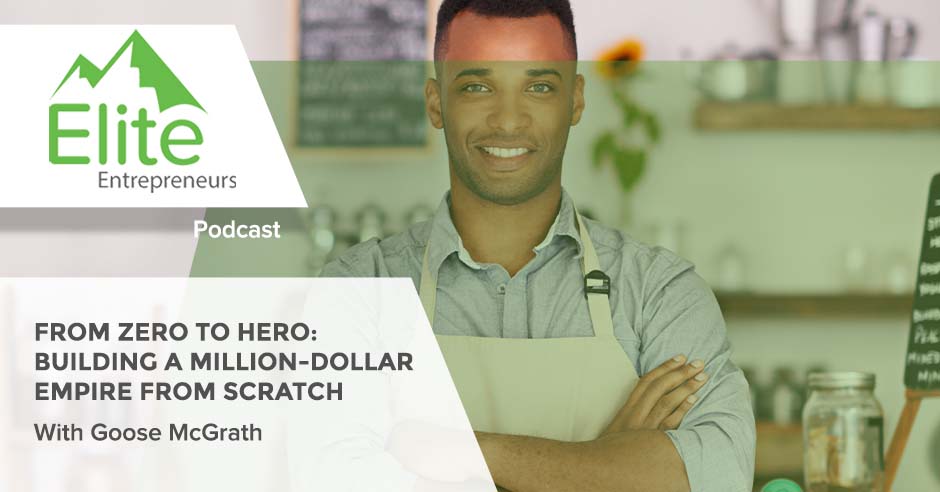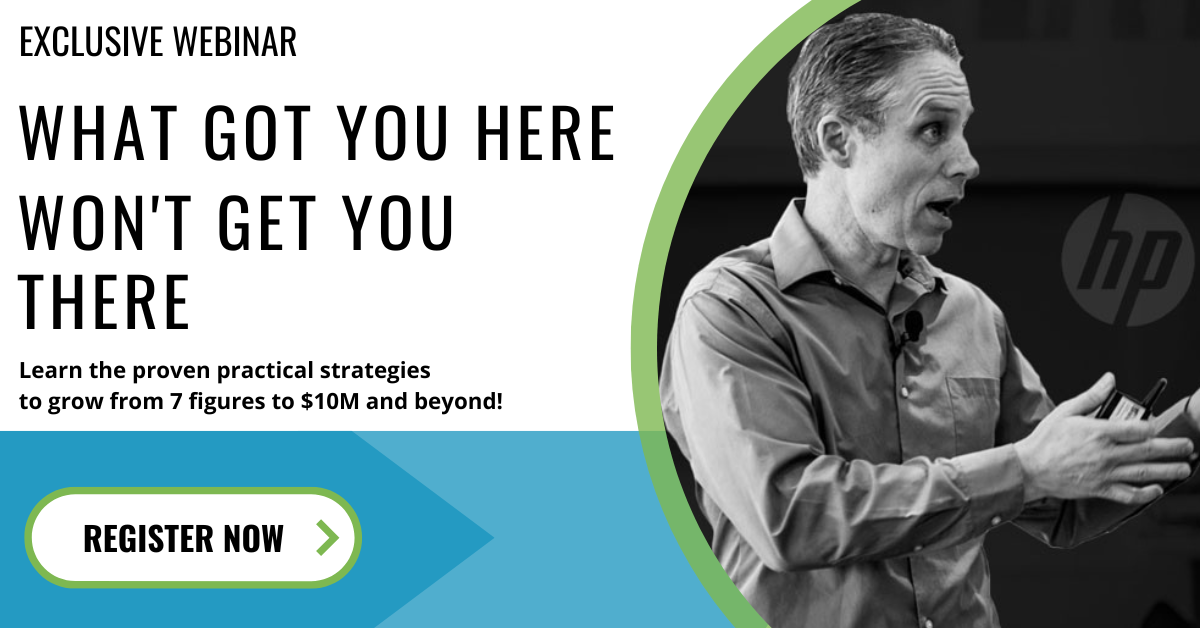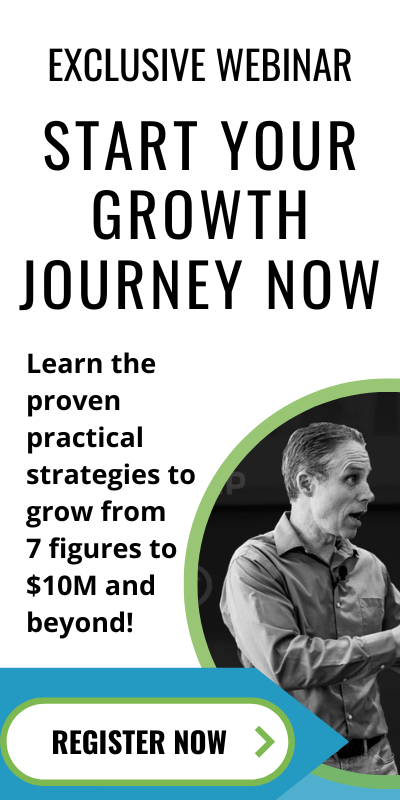Episode 159: From Zero To Hero: Building A Million-Dollar Empire From Scratch With Goose McGrath
It’s a goal for many businesses to reach the one million mark, but when they do get to that journey, they realize that a lot goes into scaling this stuff. What does it take to build a million-dollar empire? Joining us in this conversation is the founder of one of Australia’s fastest growing tech companies, Goose McGrath.
What the podcast will teach you:
- How Goose went from nothing to building one of Australia’s fastest-growing companies
- The relationship between the leader’s growth and business growth
- What to focus on as the business grows larger
- Why conquering fear and doubt is essential to business success.
Resources:
- https://growwithelite.com
- https://goosemcgrath.com
- https://www.linkedin.com/in/glenn-goose-mcgrath
- https://dashdot.com.au
—
Watch the episode here
Listen to the podcast here
Welcome, everyone, to this episode of the show. Every episode, I get to bring another amazing guest to this show and our audience, and this is no exception. He is a very successful entrepreneur. He’s built one of the fastest-growing Australian companies. He lives a wonderful lifestyle. He’s growing fast in his business.
‐‐‐
Welcome, Goose McGrath. I am glad to have you on the show.
It’s a real joy and a pleasure to be here. I love the work you’re doing with this show. It’s really needed because there’s very little material, support, or that kind of stuff out there for people who are trying to get past that $1 million mark. What you’re doing is great.
Thank you. It’s such a goal for most businesses to get to that $1 million mark. It’s like, “I’ve arrived. I got the thing off the ground,” and then it’s like, “There’s more to figuring out how to scale this thing.” We love having guests like you who’ve been there and could share some of those lessons learned. I want to jump into it. Before we get into your lessons, though, let’s have you share a little bit about Dashdot. It’s an exciting company. I could say lots of things about it, but I’d love to hear it from you.
At the core, Dashdot is a property investment company. We do things fairly differently, and that’s been part of the secret to our success. We’re not a typical real estate agency. We built a business that was designed to help specifically Australians, at this stage at least, to successfully build a property portfolio so they can achieve financial freedom. That’s what everyone wants. They want more time. They want more freedom, more choice, and more abundance. They want all that kind of stuff.
The problem is that in Australia particularly, that’s a very hard thing to do because we’ve got different lending structures and all of that kind of stuff. The way we went about doing that was by building a consumer-centric business. We’ve always put the clients at the very core. We designed a business specifically to solve their problems all the way through. That has led us to invest over $5 million in technology, data science, and all this kind of stuff to develop and invent entirely new technologies that have never existed on the planet in order to solve these problems better. That, at the core, is why we’ve been able to be so fast-growing.
Most businesses say, “What industry am I in? What business model am I going to operate with? Let me try and get some customers and I’m going to try and make revenue.” We said, “How do we continuously and voraciously solve the problems that exist for our specific clients?” That has been really important. The thing is, we face that problem too. That’s why we started it.

Million Dollar Empire: Instead of building a business model and then trying to get some customers, it’s better to continuously and voraciously solve the problems that exist for your specific clients.
Here is a very quick bit of background. I won’t bore you with the entire history. Gabi is my partner in business and in life. We were working in a completely different industry. We were working in the events and festival sector. That was fun in my 20s, but once I got into my 30s, I realized that that was not going to take us anywhere. We were going nowhere fast. We were broke.
When Gabi met me, I was an alcoholic and drug addict living on my office floor. That was only a few years ago. I’ve been sober since Christmas 2018. In 2019, Gabi and I finally decided, “How are we going to get out of this mess?” We thought, “Here’s the big idea. We’ll invest in real estate.” All you do is invest in real estate and somehow, you magically become financially free. Unfortunately, that’s not true.
We bought the wrong property in the wrong place at the wrong time and it lost a bunch of money. That caused us to go, “That’s not what we thought was going to happen. Why did that happen? How does this work? How can we solve that problem?” In the first instance, we were trying to solve that problem for ourselves. After we developed some capabilities, skills, and all of that kind of stuff, we went, “We’re not experts here, but we’ve learned a bit. We could probably help some people avoid the mistakes that we made. Wouldn’t that be cool?” The grand ambition when we very first started was to help ten people. We didn’t sit down and go, “We’ve got this billion-dollar business idea.” We were like, “Imagine if we could help ten people.” I still remember the conversation. We were like, “That would be crazy.”
I promise I’ll shut up in a second, but when we started the business, we had $5,000 to our name. We had no safety net and no backup. We had never worked in the industry. We didn’t know any property investors. We didn’t have a network. We had nothing. We’d never really done sales or marketing. We sure as heck hadn’t run a business before. I had run a business before, but when I was running those businesses, I didn’t even know what a P&L was. That will give you some context on how well I was running those businesses.
We were starting from scratch. We had so little money at the start that we had to choose between spending that $5,000 on growing the business, ads, marketing, and all that kind of stuff or eating food. We always chose the business. We would walk around the supermarket eating food off the shelves. That was how we would eat in the first couple of months. We’d go down to the supermarket, walk around, and go to the deli. We’d get some salami and some cheese, do a bit of a lap, and then walk out again and go back to work. That very first stage was brutally hard. That was only a few years ago. We’re coming out to our 5th birthday on April 1st, 2023. Since then, we’ve been able to grow into one of Australia’s fastest-growing companies. We’ve got a team of nearly 100 people. It’s been a wild success.
That’s quite a ride. You said several years ago, you didn’t really know anything about running a company. Five years into this, you’re getting a crash course on how to run a company. As we say in the States, you have 100 people and millions of dollars of annual turnover or revenue. That’s quite a success story. I didn’t properly introduce your title on the front end. You and Gabi are cofounders. You’re in the role of CEO. You’re on this rocket ship that’s growing really fast.
We can’t do the play-by-play over the last few years and the growth to 100 people, but if we could go back in time a little bit to when you had 10, 12, or 15 people and this thing was getting off the ground and you were like, “This is going to work. Now, we have to figure out how to scale it.” Our show is all about helping with some of those real in-the-trenches lessons learned that you had to go through as a leader.
You had a transition from an entrepreneur to a capable business-building CEO. There’s a leadership transition and a company transition happening as the systems and processes have to mature. You’re like, “We have to align more effort with all these people. We got to figure out how to hire great people, build a culture, and all that stuff.” As you think back to that stage specifically in your growth, I’d love to start to outline what were some of the top-of-mind biggest things that you learned as you were going through that.
I speak to business owners pretty regularly. Anytime a business owner says, “I’m stuck at this number,” whatever number that is, whether it be $1 million a year or $5 million, “I’m stuck here and I can’t work out how to get past it,” I say, “It’s not a business problem. It’s a you problem.” You’ll be limited by the founder’s ability to continue to grow specifically. If you’ve got to that point and you can’t get past it, it’s you. It’s not the business. That’s really it.
Any time you’re stuck at a number, that’s not a business problem. That’s a “you” problem. Click To TweetThe question you’ve asked is really interesting and is something that I’m passionate about as well. My sweet spot when I’m talking to other business owners is how to go from that $1 million up. If I go back to 2020, we had been growing pretty quickly, but we’d been growing messily. We randomly hired some people. It was chaos, but we were growing. We thought we were doing great because our top line was growing, but the business was a mess.
Back in January 2020, a mentor of mine said to me, and it was the biggest wake-up call, “Do you know what your problem is? You’ve got no business acumen.” I was like, “Wow.” It hit me like a ton of bricks because, instantly, I knew he was correct. We’d worked out how to do sales and marketing. We’d worked out how to make money. We were like, “That’s business.” That’s not business. Making money is a part of business, but it’s not business. That was a wake-up call to me.
Making money is a part of business, but it's not business. Click To TweetAlso, in 2020, COVID hit. When COVID hit, we had a 97% loss of incoming revenue from 1 month to the next. In addition to that, we had naively offered all of our past clients as part of a better signup unconditional money-back guarantee policy. It meant that at any point, they could ask for their money back. We had 94% of our existing clients asked for a refund, and we had a 97% loss of revenue. We went back to walking around the supermarket and eating food off the shelves. We were back there again one year later. It was this rocket ship. We went up and then back down and crashed back to earth. We nearly didn’t make it.
During that time, we really got to ask ourselves some great questions, like, “What is it we’re trying to build?” We weren’t building a business that we would be proud of. We were building a mess. We said, “What would we need to focus on? How would we need to think about this differently?” and all of that kind of stuff.
On one side, we were like, “We need to build technology to enhance the way we’re serving our clients and all that kind of stuff.” From a business functional perspective, we realized that culture was going to be the key. We realized that we couldn’t build the business that we wanted to build unless we could build a world-class culture. That included building a place that people wanted to be but also hiring systems and all that kind of stuff.
In 2020, Gabi and I started to think deeply about things like, “What is our vision? What is our mission? What are our values?” The vision can change a little bit over time as you continue to evolve and grow, but some things need to remain core. We started to crystallize all of that thinking we wanted to stand for. We were like, “Where’s our place in the market? Who are we? What type of business do we want to be? What type of people do we want in the business?” That’s where all the thinking came from.
I’ll skim over that a little bit. I’d be happy to dig into it, but on the 1st of January 2021, we were a team of 4. 18 months later, we were a team of 85. We went from 4 to 85 with no venture capital, no outside funding, nothing. That is a very steep hiring curve to go from a team of 4 to a team of 85. In order to do that, we recognized that we needed to build really great people systems. We needed to work out how we could attract, hire, and retain the right talent.
Everyone has a choice where they work. Believe it or not. They don’t have to work for your business. They could go work for another business. They’ll probably do that if your business isn’t great and doesn’t help them fulfill their personal needs. Money is just a part of it. We pay people well. That was always a big part of it. I’m lucky enough that I’ve never had a real job. I hear stories of people working in offices and all of this kind of stuff and I think, “That sounds so weird and toxic to me.”
Thankfully, Gabi and I have both never had real jobs, so we got to sit down and say, “If we’re going to build a business that’s going to hire all these people, we’re going to become a real company, what do we want this company to feel like?” We said, “It’s going to need to be the kind of place that we would want to go to work. It’s going to have to be the place that everybody else is all going to want to go to work and show up.” We put a lot of thought into how we do that, how we develop culture, how we hire the right people, and how we build the right people systems.
At the end of the day, as your business starts to get bigger, it boils down to two core areas that you need to focus on. Those are people and finances. That’s it. There are steps before that, but if you ask me, aside from thinking about strategy and stuff like that, “What are the two main things that I need to focus on?” It’s people and finances. The sooner you can understand that, the sooner you can start to realize that you are not the business and the business is not you. You get to treat it for what it is and start to grow the business rather than thinking you’re inside it.

Million Dollar Empire: As your business starts to get bigger, it now boils down to two core areas: you need to focus on people and finances.
The personal evolution that I had to go through was radical. Alongside Gabi, I had to go from jack of all trades, do it all, and bang every drum to, “How do I empower and lead people so that they can do their best work? How do we set up systems so that we can reliably achieve consistent outcomes and all of this kind of stuff so we can get to the next level?” There’s a lot in there. We could probably dig into any part that you like.
The more you talk, the more I’m like, “We could be best buddies.” Maybe you don’t feel the same about me, but I love everything that you’re saying. It’s what I’m passionate about. The business owners who learn what you’re talking about are the ones who are able to scale their business successfully. Yet, for many of them, it’s the last thing they want to spend any time or energy thinking about.
They want to focus on sales and marketing because that’s where all the dopamine is and the dollars are. It’s like, “Win. We get more money.” If you don’t figure out how to do this other work that you’re talking about, the business-building work, I’ll call it, you don’t have a real business. You have maybe a revenue-generating thing that’s going to implode if it gets too big. I love what you’re saying.
Selfishly, I want to go all the way back to one of the first comments you made, which was this business cannot outgrow you as the leader. You said if you’re stuck at a certain level, that’s because you’re stuck. It’s a you problem. It’s not the business. In most cases, we’re not talking about Blockbuster Video here. Maybe if they had the right leadership, they would’ve made a different choice as well. Talk more about the connection between the growth of the leader and the business owners. In this case, it’s you and Gabi. Talk about the growth of the leaders and the correlation with the growth of the business.
A very core belief of mine is that you, in true absoluteness, get to decide your reality. The challenge with that is that your ability to decide what that reality looks like is limited specifically by the perspectives you have. For example, if you grew up in the middle of a desert, you had no access to the internet, television, or outside stimuli. All you’d ever known was sand dunes all around you and all that kind of stuff. Somebody said, “If you can be anything you want in the entire world, what do you want that to be?” Your perspective is going to be limited. You’re not going to be able to think, “I want to be Elon Musk,” because who is Elon Musk? You don’t know. You have no connection.
We operate within this interesting dichotomy where we can simultaneously be anything we want to be. I mean that truly. I’m a big advocate of really trying to test those boundaries, which is why Gabi and I travel the world. We do all this kind of stuff whilst also building a big business. We’re like, “How do we test these boundaries?”
The thing is, if you are stuck, you probably lack perspective. If somebody’s stuck, they might not even know how to grow because they don’t know what the next step looks like. You can’t grow into something that you can’t see. Every single thing that exists on this planet, the walls around me, and the computer we’re talking through, all started as an idea. Until you can get the thought there, you can’t become it. The question is, how do you get the thought? That’s really interesting.
When we started hiring, going from 1 to 85 employees, that’s fast. There are companies that have done it faster and have had hundreds of millions of dollars of VC capital, but it’s fast. When we were at twelve, it was like, “This feels crazy.” I had to go, “How do I adjust my perspective?” What I would do is I would do things like research who’s done it before.
For example, I looked up how many employees Disney has. I can’t remember the exact numbers when I looked it up, but it was something like 223,000 employees globally. That was in 2021, and they’d been around for 100 years. This isn’t exact, but I was like, “223,000 divided by 100 years, that’s 2,230 employees a year.” They didn’t hire that in the first year, but you get the idea. I was like, “I’m worrying about hiring four. If they can hire 2,000 employees a year for 100 years straight, this is doable. I got it.”
You’ve got to start to elevate your perspective around who you are, what you want out of life, and what you want your business to be. Your business can be anything you want. I’m a very strong advocate of not chasing more. I don’t think that everyone should be like, “I’m going to grow the biggest business possible.” In fact, I spoke to a business owner a few months ago who was freaking out because his business was chaotic. I said, “What is it you’re trying to achieve?” He said, “I’m trying to get to $10 million.” I said, “Why?” He said, “Because everything will be sweet when I get to $10 million.” He had this idea that somehow, he was going to get to $10 million and then all of his problems would be solved.
I said, “How much are you doing in profit?” He said, “I’m doing about $800,000 a year in profit.” I’m like, “That’s a pretty good life. The problems you have now won’t spontaneously solve themselves by the time you get to $10 million. In fact, they’ll probably be bigger and worse unless you sort it out.” This idea of more is not necessarily the goal. You have to ask yourself, “What is the goal?” Define it and grow into it.
You can have whatever you want. You need to decide what it is. That’s the hardest part. Most people don’t stop to think about it. They get into this automatic process of, “If I keep doing more, then somehow, I’ll end up at the promised land of happiness, fulfillment, joy, and success.” That’s not true. That is categorically incorrect. I’ll talk personally, and I’m pretty sure this holds true. It starts to become relatively academic beyond a certain income level and beyond a certain net worth level. It’s not that important.
Once you get to that point, you realize that more doesn’t mean much. You can then start to have a pretty rude awakening if you haven’t decided who you want to be in life. All of a sudden, you’ve had this identity that’s been built on this vision of success that, if you arrive there, may not even be fulfilling in the first place. The business is the single greatest personal development, course, tool, or program that you can ever do as long as you treat it like that.
Business is the single greatest personal development course you can ever do, as long as you treat it that way. Click To TweetI love that. I had to respond verbally to that because it’s the single biggest personal development vehicle that there is if you treat it that way.
I’ve seen business owners who are 50 or 60 years old and they’ve run the same businesses for 40 to 50 years. Maybe not 40 to 50 years, but you get the idea. It is not that there’s anything wrong with that, but the problem is they stopped growing about 30 years ago. As a result, they’ve had 30 years of personal emotional stagnation. What kind of state do you think they’re in? Pretty unhappy. They’ve probably got 5 cars, 10 houses, and 1 boat. They play golf all the time. They’re miserable. The question you’ve got to ask yourself is what you are trying to create. If you can define that and what constraints you want to operate within, you can then create something that is beyond your wildest dreams, not just financially but spiritually and emotionally from a fulfillment perspective.
If you can see it. Right back to those perspectives, and you’ll appreciate this, one of my guests said one time, “You can’t see the label from inside the jar.” One of the perspectives is how you see yourself. That’s not the only perspective, but what you can see possible for yourself and your business and then creating it mentally and spiritually first before you even start laying any bricks to make it happen is essential. We don’t take time. We get into the routine. We let the chaos of the current business take us down the stream because we’re busy doing it.
100%. I’ll add something to that. It is really important that everyone knows this. You are not your business and your business is not you. It’s very personal when people start a business because you’re doing everything right. You effectively are the business at the start. You are the business and the business is you at the start, but that can’t continue to be the case. That means that you have a fluctuation anytime the business has any kind of fluctuation or whatever. That’s not okay.
You are not your business and your business is not you. Click To TweetWhat you need to recognize is that you’re a shareholder and an investor in a company, and also, perhaps, you have a job. I’m a shareholder in Dashdot, and I also have a job as CEO. Gabi managed to get herself off the org chart, so we say she won. She got to retire first. She still works very actively in the business, but she has managed to escape the tradition of reporting lines and all that kind of stuff.
She’s like, “Don’t put me in a box. I’ll float around.”
Bingo. She adds tremendous value. There’s no question there. I’m the schmuck that’s still got a job and gets paid a salary. That is true, and it’s a really important consideration for people. Once you realize that the business is a beautiful living, breathing thing full of wonderful people and parts of the system and it’s not you, you get to observe it from a perspective that allows you to make better decisions. You’re like, “As a shareholder, do we want to invest our capital in this way? Is there a better risk-return profile that we could get for our capital?” Starting to lean into that thinking allows you to operate better. Unless you do that, you’ll still be stuck inside the business for a long time.
Sometimes, I’m on the other side of the microphone and I’m a guest on people’s shows. This thing you’re talking about is something that comes up when I’m sharing. I like to think about it as the separation of the Siamese twins. That business does deserve to have life on its own, and it should have life on its own separate from your identity. That business-building or that business-creation work breathes life into it if you do it right.
You can become purpose-driven and based on core values. All that work that you and Gabi did to say, “What do we really want? Who are we? How are we going to build this thing?” you gave life. You breathe life into your business, separate from you. That key step often doesn’t happen. That business owner gets stuck in the machine like that. That’s beautifully articulated. Thank you for sharing that.
You guys had this experience of going from 4 people to 85 in 18 months. I know a little bit about hiring at that rate and I know what kind of people, processes, and systems. You referenced it a little bit. It’s not just the volume of hiring but how you dial in your selection process in a way that you preserve the purity of this life or this business that you created. You don’t want to have it get all messed up with the wrong people. How did you hire that fast but hire the right people that fast?
Hiring fast is one thing. Anyone can hire fast. It’s really not that hard. You say yes to everyone.
If you have enough in the bank account, you can do it, right?
Yeah, or even if you don’t, you can still hire them.
You can fake it.
I know a business owner who hired a lot in the last year and has retained almost no one. Hiring and retention are two different things, but they are deeply connected. Let me kind of zoom out a little bit. We think about it in two ways, character and competence. We need to assess people in both areas. The competence piece is not that hard. That’s the, “Can they do the job? What kind of questions could we ask to validate if they could do the job? Can we put together some tests for them to do the job?”
I’ll break down our hiring process a little bit because it might be useful for people. Even when there was record-low unemployment and most people were struggling to get any applicants, we were getting so many applicants that we would have to turn our ads off after one week because we were getting too many applicants. It starts with how you write the job ad. When you write the job ad, spend as much time on it as you would and any other piece of marketing material because you’re marketing. You’re selling. It’s a funnel. It’s a funnel the same as your client acquisition or customer acquisition funnel. It’s a talent acquisition funnel.
We start with the ad. We craft a compelling ad. What we do is we put all these things upfront first, such as what’s in it for them, all the rewards they get, and then who we are, what are our values, what’s our mission, and all of this kind of stuff. We put that way first. The first thing people read is what we are about, what’s our vision, and what’s in it for them, and then we talk about what type of person is required for this role. Those are the characteristics and attributes we’re looking for, the traits that they would have. We then talk about the responsibilities. That comes last.
Once you’ve done that, you’ll be getting up with a ton of job applications. We use normal online job platforms. In Australia, it’s Seek, but it could be Indeed and stuff like that. We then go through a CV filtering process. We get out all the people who are like, “Why did you apply for this?” We get rid of them. We then put them through to a testing platform.
We use a platform. We have no affiliation here, but we use TestGorilla because we found it to be quite useful for structuring our tests. We put them through that, including some video-asked questions so we get to see them talk, see them, and hear them. You get a lot of sense about a person in that. There are some pretty basic first-pass tests. From there, if they get approved, then they go to a first-round interview. There’s a second TestGorilla that we do, which is much more competency-based and character-based. We then have another interview process. This is multistage.
A lot of people get a CV, do an interview, and hire someone. We make them jump through several hoops. Depending on the complexity of the role and the seniority of the role, it could be 3 tests and 3 to 4 interviews before we hire anyone, so it does take a lot of time. There is nothing more important than getting the right people for your business. A lot of people have asked me in the past what is the secret to our growth. One hundred percent of the time, I say people. That’s it. A lot of business owners think about people. I’ve heard business owners say things like, “Liabilities walk on two legs.”
More people, more headaches. More people, more problems.
It is like, “Your perspective is entirely wrong.” The only reason that our business is as great as it is is because of the people inside our business. I feel dwarfed by the magnificence of the people we have on our team. You can feel that, too, if you pay attention to how you hire people. As we’re going through the process, we then break the interviews up into two parts, which are character and competence.

Million Dollar Empire: The only reason that a business is great is because of the people inside the business.
The competence piece is, “Can they do the job? Is there a proven track record? Do we reliably believe that if they were to get those tasks, they could do those tasks or that we could train them to do those tasks?” It’s easy and pretty simple. The character piece is really interesting. Different roles will have different character traits that you might be looking for. It will have different aptitudes and different personal compatibilities.
Someone who’s in a back-of-office highly analytical role may not need exceptional amiability and ability to speak to clients, but being analytical is going to be a good thing. You want to look for these different character traits by role, but then you want to look for commonality of values. We hire for values and character.
What you want to know is, “How is this person going to fit within our organization?” A lot of people are looking for culture fits, but that can be a little bit misleading. If you hire for culture fit, what you’re trying to say is, “Is this person like everybody else in our business?” That’s the wrong way to think about it. What you want to look at is culture add.
I think about culture like a Petri dish type or a science dish type thing. In that pure culture, we are going to grow something there. Inside that Petri dish, we already have a bunch of different things growing and all of this kind of stuff. They’re growing into some symbiotic harmony. If I take a drop of this person and put them in that Petri dish, is that going to make the culture, the thing inside the dish, better, weaker, or the same? If it’s the same, that’s okay. That’s not bad. Particularly if they’re going to be good at their job, that’s fine. If it’s going to make it better, that’s what you want to aim for.
We’ve focused heavily on, “How do we make sure we have a team of A players?” A great book on this is Who by Geoff Smart. It’s a great foundational point. We use that in the first instance to think, “How do we work out the scorecard systems and stuff like that?” We want to think about, “Is this person going to be right for my organization?” We have a policy of no talented jerks. It doesn’t matter how good you are at your job. If you are not going to be compatible with the people inside the business, then we don’t want you.
I love it. I am sitting here and soaking it in because everything you’re talking about is stuff that we teach and try to get people to do. I could sit and listen to you for hours talking about all the ways that you guys have built a successful company. We’re coming up on the time that we had budgeted for this. As you think back to the Goose McGrath from a few years ago as you were starting on this journey, is there anything else you would throw out there as like, “This is my one other piece of advice or one parting thought for these business owners who are trying to make that change?”
Yeah. I’ve become a lot more philosophical over this journey.
Say more about that.
In the first instance, when we started, we had $5,000. We had no safety net and no backup. We started on the 1st of April 2019. We were working 18 hours a day, 7 days a week, doing all this kind of stuff. I remember Gabi asked me at some point later in 2019. It was maybe September or October. She was like, “What’s driving you?” I said, “Fear.” I was really clear. I was like, “Fear is driving me, like fear of failure. There is no fallback option here. That’s it.” When you’re operating from that place of do or die, that’s useful for a while, but it’s not sustainable. I believe that hard work is very important in the early stages, but that’s not the way that you need to continue to run your business if you want to see it grow.
If I think back to the past couple of years, the biggest problem has been fear. When you have fear and doubt, you don’t make good decisions. At a very baseline level, and I mean this, you need to understand that you cannot fail no matter what happens. Even if all of a sudden the business collapses, you will be okay. You will not perish. You will work it out.
The biggest transformation for me in the last few months is a little mantra that I keep rolling around in my head. It is, “I live without fear or doubt.” There are a lot of cortisol spikes that happen throughout the business journey where suddenly, you feel gripped in your chest and it gets tight. You get anxious and you’re like, “Am I going to make payroll?” There’s all this stuff. The sooner you can let go of that, the sooner you can calmly walk towards solutions and the easier your life gets. The things that are happening in your business won’t be any different whether you feel anxious or not. It takes time.
I have a very high cortisol response. My natural state is this high-stress state. All you need to do is look at Colonel Sanders. He was 84 when he was trying to start KFC. For most people reading this, you’ve got decades ahead of you probably. It doesn’t matter. Even if you completely fail and this business collapses, you can start again or do something else. It doesn’t matter. None of it matters.
The only thing that really matters is your fulfillment, your happiness, and your ability to see that. That’s a choice too. Even if your business fails, you could be delighted because you’ve learned. As soon as you realize you cannot fail, fear will not serve you, and you can truly live without fear or doubt, the easier the business will become.
The more you realize that fear and doubt will not serve you, the easier business becomes. Click To TweetI love that. Thank you. It has been an honor to have you on our show. Congratulations on what you and Gabi have built in your business and your life. It’s fantastic. You’ve shared many things, but I’ll highlight a few for our audience. Think back on the idea that if your business is stuck, it’s you, not the business. How can you see differently? How can you become something different so your business can grow?
I love all the insights on the hiring or selection process being really dialed in on the culture and the character. You need the capabilities and skillset, but the culture and character are what make it doable for you to keep a team together. I can tell you’re thoughtful. You think through all these things. You’re like, “What matters is the people and the finances. If I get that dialed in, I need to set a vision for people. I need them to know where we’re going, and then I have to build the team and make sure we have the financial runway.” That’s it. You said that so beautifully, as well. Thank you for being on the show. It was a pleasure.
It’s a real pleasure. Thanks for having me.
Please keep tuning in to the show. Share, like, and rate it. Do all those things. Review on your favorite platform. We want to help as many seven-figure business owners out there as possible. Lots of great guests and lots of great lessons learned. Keep tuning in. We’ll see you next time.
Important Links
About Goose McGrath
 Hey! Nice to meet you, I’m Goose. I’m a multi 8-figure entrepreneur, investor, podcast host, author, and full-time nomad. I’m the co-founder and CEO of Dashdot, one of Australia’s fastest-growing companies, and also Australia’s leading property portfolio growth partners. I’m also the host of The Wild Goose Chase & Dashdot Insider podcasts, and author of Limitless: The Renegades Guide To Building Wealth Through Property. I’m passionate about helping people to build wealth and live their most fulfilling lives.
Hey! Nice to meet you, I’m Goose. I’m a multi 8-figure entrepreneur, investor, podcast host, author, and full-time nomad. I’m the co-founder and CEO of Dashdot, one of Australia’s fastest-growing companies, and also Australia’s leading property portfolio growth partners. I’m also the host of The Wild Goose Chase & Dashdot Insider podcasts, and author of Limitless: The Renegades Guide To Building Wealth Through Property. I’m passionate about helping people to build wealth and live their most fulfilling lives.
Which is why Dashdot is focused on helping everyday Australians to build wealth through property much faster and with less risk, thanks to our advanced data science and technology. And which is also why I create content that for entrepreneurs who want to grow a 6, 7 or 8 figure business, whilst travelling the world, and living a life on purpose. I also invest in companies, so if you’re looking to grow, and want some help with that, reach out and we can chat. In any case, if you’re reading this, I hope you have a wonderful and enriching day.
Want to listen to more? View all episodes here >



